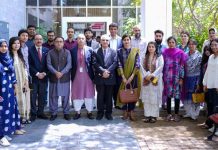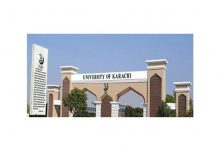No nation can progress without investing in education and research. We have to look up at science and technology, research oriented culture and innovation policies for the success and prosperity of the country.
There is no shortcut to develop country’s economy and no progress is possible at all without giving priorities to education and research. These views were expressed by the Vice Chancellor, University of Karachi, Professor Dr Khalid Mahmood Iraqi, on Friday.
He was addressing at the inaugural ceremony of the three-day long second international conference on chemistry and its role in sciences. The conference was held at the Auditorium of Department of Chemistry, KU.
The KU VC Professor Dr Khalid Iraqi said that chemistry is one of the basic scientific disciplines and played very vital role in the development of mankind. As we all know about the importance of periodic table and how our lives changes after its invention.
He also said that this was very significant achievement in science and Russian chemist Dimitri Mendeleev discovered and arranged the chemical elements by atomic mass 150 years ago. To pay tributes to his services, this year is being observed as International Year of Periodic Table by United Nations Educational, Scientific and Cultural Organization and the chemistry department has also arranged this conference in this connection.
Meanwhile, Janusz Lipkowski of Cardinal Stefan Wyszynski University, Warsaw, Poland, shared that official history of micro – or nanoporous materials started about 70 years ago when Powell, based on his original crystallographic studies has introduced the term clathrate to describe spatial rather than chemical interactions between the components of the two – or multi-component materials.
He said that chemists, however, have known properties of the materials of the sort for quite long time before, starting with Sir Davy’s discovery of water clathrate of chlorine. X-ray crystallography served as the tool to rationalize the results previously known and has been the physical basis for enormous development of the field.
He expressed that concept of clathrate compound has been one of major discoveries in chemistry. Originally, it was concentrated on spatial fit between the host and guest components. Soon a physicochemical rationale for defining the stability conditions for clathrate formation was reported.
The conference secretary, Rafia Azmat, said that enhanced photochemistry is directly related to the enhanced photobiology of the plants which in turn proves that it is only the best possible solution of atmosphere gaseous pollution control. These new prospective of dual symbiosis used as innovative fungal engineering for Sustainable green environment.
The Chairperson, Department of Chemistry, KU, Dr Hajira Tahir said that rapid evolution of nanoscience and nanotechnology during the past few decades has demonstrated that nanotechnology holds the key role in many of the technological advancements of the 21st century in different sectors including pharmaceutical, electronic, energy, textile, coatings and paintings.
She further said that nanotechnology has emerged as a versatile platform that could provide efficient, cost-effective and environmentally acceptable solutions to the global sustainability challenges facing society today.
Dr Hajira added that novel materials with unique properties derived from their small size. For energy sector nanomaterials intervenes the energy flow that starts from primary energy sources and finishes at the end user. The non-renewable energy sources (oil, gas, coal and nuclear) can be solved by technological developments aimed at increasing efficiency and reduces emissions of renewable energy sources.
Another keynote speaker, Arif Kazmi from Georgia Gwinnett College, USA, said that world has been hooked on the use of fossil fuels for generation of energy for a long time. In recent times, the increasing numbers if consumers have adopted a lifestyle requiring ever greater demand for electric power consumption and fuel for mobility.
“Many countries including Pakistan do not have indigenous fossil fuel insufficient quantity to meet these demands. Besides use of fossil fuel for electric power generation and transportation leaves a carbon footprint which is affecting the climate in an adverse manner. Ever increasing air pollution, particularly in urban areas, is harmful to human health.”
He added that many approaches towards use of solar energy for splitting water molecules to produce hydrogen for use as fuel are underway in different parts of the world. They key to success would be finding photo catalysts which are inexpensive and have a high turnover number as well as photo stable.
,,,,,,,,,,,,,,,,,,,,,,,,,,,,,,,,,,,,,,,,,,,,,,,,,,,,,,,,,,,,,,,,,,,,,,,,,,,,
KU announces BCom Part II result.
The Controller of Examinations, University of Karachi, Professor Dr Arshad Azmi, on Friday announced the result of BCom Part-II, Annual Examination-2018.
He mentioned that 16, 230 candidates were registered of which 15, 766 students appeared in the exams. As many as 743 candidates managed to clear all papers with first division, 3, 274 students with second division and two candidates were declared pass in third division while 11, 747 students failed to clear their exams. The overall pass percentage was 25.49 percent.
Ayesha Nafees daughter of Muhammad Nafees, bearing seat number 520091, student of Sir Syed Government Girls College, clinched overall first position by obtaining 1091 marks out of total 1400 marks.
Meanwhile, Bushra d/o, seat number 520099, Sir Syed Government Girls College, bagged second with 1090 marks and Ramsha d/o Abdul Razzak, 520885, K. M. A. Girls Degree College stood third with 1082 marks.






















